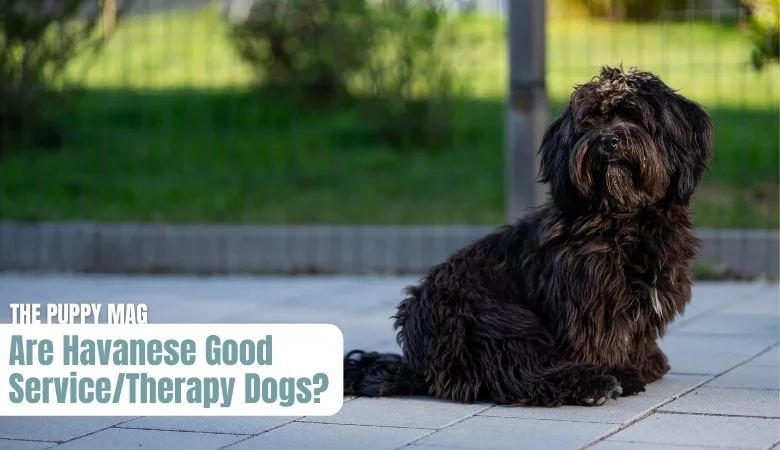It takes a particular kind of temperament and character to make a reliable therapy dog, so what about Havanese?
We’ve all heard amazing things about this breed, but can they make it as a good service dog? There’s a few potential drawbacks that owners should know. This article explains everything you need to know.

Table of Contents
Havanese Being Service Dogs: Possible or Not?
Havanese can make great service dogs with little training. Not only are they intelligent, but they are sensitive and highly attentive to their owners.
However, Havanese are also very small and have high energy with hyperactive tendencies as puppies, so this is something worth considering.
Ultimately, certain service roles would suit the Havanese better than others, and we discuss this below.
What Makes a Great Service Dog
For those suffering from various psychiatric challenges, a loving and supportive dog can be life-changing. Service dogs are highly attentive to their owners and will act promptly when sensing their owner is getting anxious or on the brink of an attack.
A great service dog not only needs the intelligence and awareness to learn, understand and spot their owner’s triggers, but they need to have a strong attachment quality in order to build a strong emotional connection.
Not all dogs are cut out to be service dogs. Most breeds do not have the perfect combination of intelligence, affection, sensibility, awareness, and reliability that a therapy dog needs to have.
Why Havanese Make Great Service Dogs
Let’s run through the qualities that Havanese have to make them such a good choice to be a therapy/psychiatric service dog.
- Intelligent and highly trainable
- Very affectionate and attached to their owners
- Sensitive and situationally aware
- Obedient and sensible
- Reliable, robust, and healthy
- Low maintenance breed
These are all very important traits to have in order to be an effective service dog.
Affectionate:
Havanese have had the nickname “velcro dogs” for a long time… They got this nickname due to how much they love to be with their owner at all times. These little fluff balls have an endless amount of love to give.
Attentive:
This kind of attentiveness makes it easy for Havanese to detect their owner’s triggers early on and effectively prevent a breakdown.
Reliable:
Havanese are also obedient and sensible. A trained Havanese can be relied on in both a quiet private setting, as well as outdoors in a public area.
Positive attitude:
Lastly, Havanese are a positive bundle of joy that have a happy-go-lucky nature about them. This cute playfulness can put a smile on anyone’s face.
Popular article: Can You Shave a Havanese? Exactly Why You Shouldn’t!
Potential Drawbacks With Havanese
We’re not here to sugarcoat anything, and despite ticking most boxes, there are a few potential drawbacks to be aware of.
Young Havanese have a lot of energy
Havanese puppies and young adults (up to 3 years old) have A LOT of energy.
The consistent energy levels of the Havanese could be unsettling and may not be appropriate for those with certain psychiatric challenges.
It’s not all bad news though, energy levels can effectively be managed with plenty of physical exercise AND mental stimulation. And not to mention that most Havanese will mellow out naturally with age.
Havanese are very small
While many actually prefer having a small dog to act as their companion, some find a larger dog provides them with a greater feeling of safety and security.
In addition to this, a Havanese may not be an appropriate service/assistance dog for the blind or other physical disabilities due to their small size and lack of strength. Larger dogs like labradors and golden retrievers would be more appropriate to guide the blind.
The Havanese’s small physical size could go either way and despite a few downsides, there are many positives that come with it.
Havanese need firm training
Although I’ve been praising Havanese for their high intelligence, obedience, and sensibility, they still need to receive plenty of firm training in order to bring out the best in them.
If training isn’t consistent then a Havanese may end up being unruly, disengaged, and somewhat lackluster.
Consistent training is also a key part of building a close-knit bond with their owner, so this will prove crucial.
What Havanese Are Best Suited For
Overall, we think that Havanese are best suited for three certain needs. Let’s run through them below.
- Anxiety
- Depression
- PTSD
Havanese are best suited to those that require emotional support and comfort, more so than those that require physical assistance. And we say this due to their size
It will be hard for such a small breed to assistance physically, so in these cases, a larger stronger breed may be more appropriate (guide dog, responding to seizures, epilepsy and helping with general daily tasks).
What do you think? We would love to hear your thoughts: Contact Us
